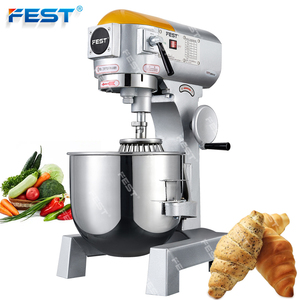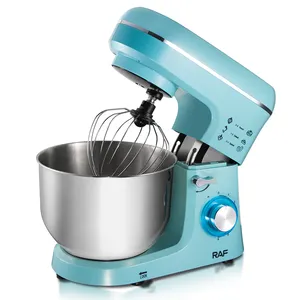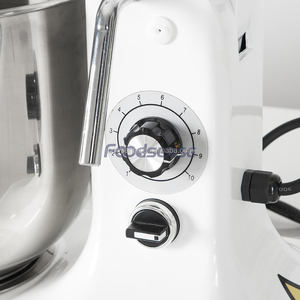(23742 products available)


































































































































































































A stand dough mixer, also known as a planetary mixer, is available in various models and capacities to meet home and business users' different needs and preferences.
Spiral Mixer:
A spiral mixer efficiently incorporates and develops gluten in dough. It has two rotating spiral arms that move the dough around the bowl. The mixers work best for large batches of bread dough. Because it puts less strain on the dough, many artisan and professional bakeries prefer it. The spiral mixer is capable of mixing and kneading various types of dough, including those that are thick and heavy, like bread or pizza dough. It features a safety cover for the bowl and an emergency stop button for the motor.
Bench Mixer:
The bench mixer has a bowl that can be tilted to provide easy access to the whisk or dough hook. As a result of its compact size, it is useful for kitchens with limited counter space. Bench mixers come with a variety of attachments that can be used for different cooking tasks, such as shredding vegetables, making pasta, and beating eggs. They are available in various capacities to accommodate different batch sizes and demands.
Planetary Mixer:
Large commercial kitchens and restaurants with a high volume of food preparation frequently use a planetary mixer. It can effectively whip, beat, and mix the ingredients. Mixing tools that can be used with a planetary mixer include a beater, whisk, and dough hook. It can handle large quantities of ingredients thanks to its robust build and vast capacity. Many culinary establishments utilize planetary mixers to prepare batters, cake icing, and bread dough.
Commercial Mixer:
For businesses like restaurants, catering companies, and bakeries that frequently prepare large quantities of food, a commercial mixer is a sturdy and dependable tool. These mixers have a high capacity and are built to endure continuous use. They are essential for efficiently mixing batters, dough, and other components in large quantities due to their robustness.
Thanks to its reliable performance and efficiency, the stand dough mixer is widely used in various industries. Here are the common applications.
Baking Industry
Dough mixers with different capacities are used in many bakeries to help mix ingredients like flour, water, salt and other components. The goal is to prepare the dough at a large scale. The stand mixers also simplify the process of making pastries, cookies and cakes. In industrial settings where huge amounts of baked goods are needed, the mixers are time-saving and consistent. Also, bakery businesses can depend on these mixers to reduce manual labor and ensure uniform mixing. This leads to good quality products.
Pizza Restaurants
Many pizza businesses depend on dough mixers to prepare the pizza dough in large volumes. The mixers combine the flour and other ingredients so that the right texture and consistency are achieved. When done with mixers, the process becomes easier and faster. This helps businesses to save time and have a steady supply of pizza bases. The tendency for owners to customize their dough recipes for different types of pizza makes the stand mixers essential to the businesses.
Commercial Food Production
In restaurants and catering companies where large quantities of bread, pastries and other baked items are needed, the dough mixers become important. They provide consistent mixing and save time. This ensures that food prep is efficient. The gear-driven mixers are heavy-duty and handle frequent use. So, they are reliable for mixing large batches of dough. Restaurants that make dough-based dishes like pasta require these mixers. They simplify the mixing process and maintain quality.
Large Scale Manufacturing
In the industrial production of bread and other baked goods, we need powerful mixers that can work continuously and hold big amounts of flour. The mixers are important for efficient production. Additionally, the mixers can be adapted to different recipes by using special attachments. This will help manufacturers to meet various customer demands. Also, the durable mixers require less maintenance. They will help businesses save costs in the long run.
When choosing a stand dough mixer for sale, buyers must consider the capacity, power, material, design, and safety features of the mixer.
The capacity of a stand mixer depends on how much dough one needs to mix. The bowl capacity is measured in quarts. A small capacity of 3 to 5 quarts is suitable for mixing small quantities of bread, cookies, and cake. It is ideal for home use. A large capacity of 6 to 8 or more than 8 stainless steel mixers is suitable for commercial use. It can mix large quantities of dough to make various baked foods. Commercial food businesses like bakeries and pizza shops prefer using large-capacity dough mixers because they save time and work.
The power of a dough mixer is important for efficient and smooth operation. It determines how heavy and thick the dough the mixer can handle properly.
Most mixers are made of stainless steel. Stainless steel is resistant to rust and durable. It can last for many years with proper use. Also, stainless steel bowls are easy to clean. Some dough mixers have aluminum bowls. They are lightweight, less expensive, and a good heat conductor. However, aluminum bowls can scratch easily.
Check the design of the dough mixer. Some have bowls that rotate while others have mixer's heads that tilt or lift. The rotating bowls move in two different motions for thorough mixing. It creates smooth and well-mixed dough in a short time. A rotating mixer is suitable for commercial use because it has a bigger capacity. The tilting or lifting design is easy to use, clean, and attach different accessories. The bowl remains stable and doesn't lift in a jerk while mixing.
Buyers must also consider the safety features of the dough mixer. Check if the mixer has a secured lock. The bowls are locked in place to prevent any movements. The tilting or detachable bowls are not rotate accidentally when the mixer is working.
Q1: How should one clean and maintain a stand mixer dough machine?
A1: For easy cleaning, remove the mixer bowl and any accessories after each use. Hand wash the parts with soapy water or place them in the dishwasher for tumble drying. Wipe the mixer body with a damp cloth and avoid using any abrasive cleaners to remove stubborn stains. Regular cleaning prevents bacteria growth and keeps the mixer in good condition. Also, lubricate the mixer’s attachments periodically to ensure they rotate smoothly.
Q2: What are the differences between a spiral dough mixer and a planetary dough mixer?
A2: A spiral mixer has a rotating spiral tool that moves inside a stationary bowl. It is suitable for mixing large batches of heavy or artisanal bread dough. A planetary mixer has beaters that rotate around the bowl's perimeter. It is ideal for smaller batches and has more versatile attachments for whipping, beating, and mixing.
Q3: Which stand mixer is the best for making bread?
A3: The KitchenAid Pro Line series is the best bread maker because it has a powerful motor, sturdy construction, and a large capacity. It can mix and knead heavy bread dough without breaking.
Q4: What is the average lifespan of a commercial dough mixer?
A4: If the dough mixer is used regularly in the business and properly maintained, it can last up to 15 years. Avoid overloading the mixer and using it for tasks that are not recommended. Also, use high-quality, lubricated bearings made with stainless steel to improve the lifespan.
Q5: How important is the capacity of a stand mixer?
A5: The size of the stand mixer impacts how much dough it can knead at once. Models with a bigger capacity are better for making large batches of bread, while smaller mixers work well for small businesses.